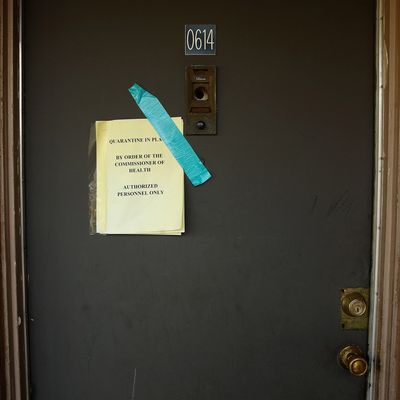
On Monday, the family of Thomas Eric Duncan, the first man to be diagnosed with and ultimately die of Ebola on U.S. soil, was finally able to leave their home after 21 days of quarantine. Across the country, however, others who may have come in contact with the virus are still confined to their homes: a romance writer, a missionary, a television news crew. It’s the best for public health. But while under quarantine, what happens to a person’s mental health? What’s the psychological impact of being a prisoner in your own home, isolated and afraid, for three long weeks?
About a decade ago, at the height of the SARS scare, one researcher in Toronto thought the question was worth asking. Laura Hawryluck, an associate professor of critical care medicine at the University of Toronto, surveyed 129 people (mostly health workers) who had been quarantined, using psychometric tests designed to spot signs of depression and PTSD. Hawryluck found that about 29 percent of respondents exhibited signs of PTSD and 31 percent showed signs of depression after the period of isolation. She published her findings in Emerging Infectious Diseases in 2004. “One of the things we kept hearing repeatedly — people told us they felt like they were almost being seen as a pariah,” Hawryluck said. “And that psychological effect on people was very distressing.
“In terms of PTSD, it was a lot of anxiety, a lot of nightmares,” she said. “And in terms of depression, it was that feeling of being completely alone and isolated, with that concern of Would someone be there for me if I got sick?”
We’re starting to hear reports from those quarantined that provide examples of that psychological distress. An Arizona man who self-quarantined (as in, voluntarily) after a missionary trip to Liberia is now getting threats from commenters on a local news website; they’re suggesting that his house should be burned down, he told the New York Times. That Times story also quoted the daughter of Duncan’s girlfriend, who told the reporter the realities of quarantine can range from the mundane (kids who won’t stop fighting) to the potentially unsafe (a broken refrigerator filled with rotting food). And Axl Goode, the exotic dancer and author potentially exposed to Ebola on an airplane, wrote this on Sunday:
I’m 26 years old and I could be dead in less than two weeks. This scares the hell out of me. Truthfully, my hands are shaking as I write this. I’m forcing myself to though, because it’s the easiest way for me to relieve tension and anxiety while getting the word out. I’m not panicking for myself anymore. I know I’ve done the best I can to protect those around me and my fate is out of my hands. But what about those I care about? What will this do to my mom, dad, and siblings?
Goode wrote that message on his GoFundMe page, which he set up when he realized he’d be missing three weeks of work owing to the self-quarantine. Financial worries like that only add to the stress. In fact, in Hawryluck’s study, she found an especially strong association between lower income and higher psychological distress.
And although Hawryluck didn’t formally follow up with the subjects in her study, she suspects that for many of them, the mental toll of isolation was long-lasting. “I can tell you anecdotally that a lot of people had a lot of lasting problems, emotionally,” Hawryluck said. “They had trouble returning to work, and some of them didn’t go back to work.”
To be very clear, Hawryluck is not arguing that health officials shouldn’t use quarantine to fight infectious diseases; in her paper, she writes that the main reason SARS was “successfully contained globally” was because of these quarantine measures. But she’s making the point that a person’s psychological health matters, too.
What could be done better? For one, psychologists or social workers could be made available, said Harry Hull, an infectious disease epidemiologist who was once the epidemic intelligence officer for the Centers for Disease Control and Prevention. Or it could be as simple as making sure the health worker who checks in with the quarantined is always the same health worker, so some sort of relationship could potentially be established, Hull said. (Science of Us contacted the CDC to ask what measures, if any, they take to ensure the psychological health of those under quarantine; we’ll update the post if we hear back.) “We’re so focused on — and rightly so — infection control measures. That’s crucial,” Hawryluck said. But it’s also vital to keep the mental health of these people in mind, she said. “We need to look after each other and care for each other better, and not just push someone out of the herd or out of the group.”




